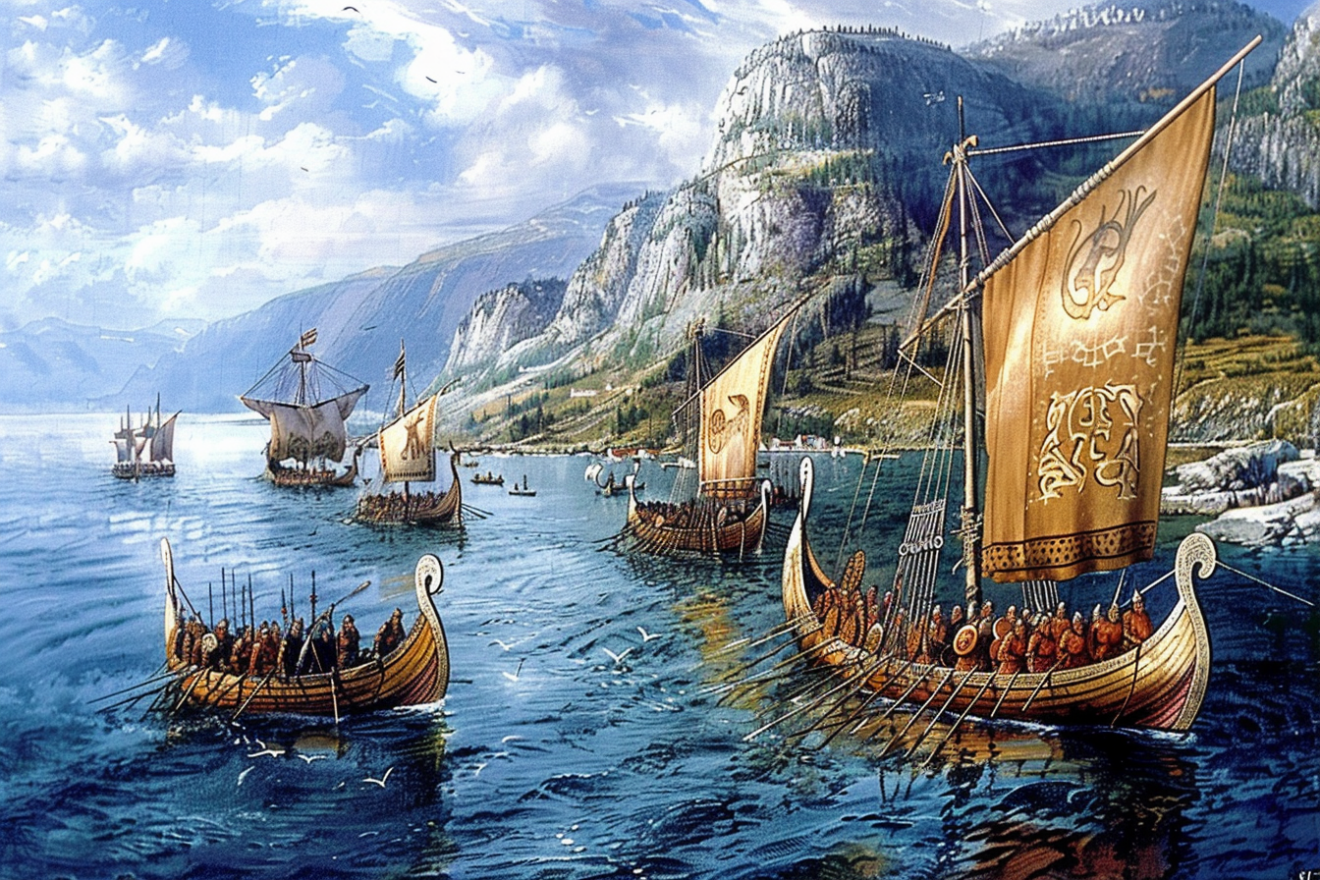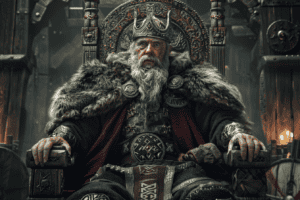The Vikings transcended plundering to become pioneering traders and explorers. Their intricate trade networks linked Scandinavia to the Byzantine Empire and beyond, fostering the exchange of goods from furs to luxury items.
Through advanced navigational skills and swift longships, Vikings navigated treacherous waters, shaping medieval commerce.
Their lasting legacy enriched European economies, influenced cultures, and spurred technological advancements, leaving an indelible mark on history. Unravel the unparalleled Viking legacy that redefined global commerce and international relations.
Viking Trade Networks

Viking trade networks connected Scandinavia to the Byzantine Empire and the Islamic world, enabling the exchange of various goods and nurturing cultural interactions. These trade routes were essential for Viking society, allowing the flow of commodities like furs, slaves, metals, textiles, and luxury items across vast distances. Key trade hubs such as Hedeby, Birka, Dublin, and York served as bustling centers where merchants congregated to conduct business and share ideas.
Engaging in long-distance trade, Vikings ventured far from their homelands, establishing connections with distant lands and peoples. This expansion of Viking trade networks not only contributed to their economic prosperity but also left a lasting impact on future trade practices. The Viking legacy in trade continues to influence modern economies, highlighting their role as pioneering traders and explorers who shaped the economic landscape of their time.
Through their extensive trade networks, Vikings not only secured valuable resources but also fostered cultural exchanges that enriched the societies they interacted with, showcasing a multifaceted aspect of Viking civilization beyond their reputation as fierce warriors.
Cultural Exchange Through Trade

Amidst the bustling trade hubs and flourishing exchanges of goods and ideas along the Viking trade networks, a vibrant tapestry of cultural exchange emerged, weaving together diverse societies and nurturing mutual understanding. Viking trade routes such as the Volga Trade Route connected Scandinavia with the Byzantine Empire and the Islamic world, facilitating cultural diffusion. Through these exchanges, luxury items, exotic goods, and craftsmanship skills were shared, enriching Viking trade interactions and cultural understanding.
The exchange of goods also extended to the introduction of new agricultural practices, technologies, and goods from the Vikings to different regions, shaping cultural landscapes along the way. This cultural exchange through trade not only boosted economic growth but also fostered social connections and mutual influences, underscoring the Viking legacy as pioneering traders and cultural ambassadors. The impact of these interactions resonates through history, highlighting the significance of the Vikings’ role in fostering cultural diversity and exchange through their extensive trade networks.
Viking Navigational Skills

Mastering the art of wayfinding was pivotal to the Vikings’ prowess as pioneering traders and explorers, shaping their ability to reach distant lands and forge new connections. Viking wayfinding skills were highly advanced for their time, allowing them to traverse the treacherous waters of the North Atlantic with precision.
One of their remarkable techniques was the use of sunstone navigation, a method that involved using special crystals to locate the sun’s position even on cloudy days. This innovative approach enabled the Vikings to sail confidently in the direction of their destinations, including Iceland, Greenland, and even North America.
The design of their longships further exemplified their expertise in wayfinding. These swift and agile vessels were essential for exploring new territories and navigating through unknown waters efficiently. The Vikings’ mastery of wayfinding not only facilitated their exploration but also played a significant role in establishing trade routes and expanding their trading expertise across various regions.
Their legacy as pioneering seafarers is deeply intertwined with their exceptional wayfinding skills, marking them as some of the most accomplished sailors of their time.
Technological Advancements in Trade

Utilizing their expertise in navigation and shipbuilding, the Vikings implemented cutting-edge technological advancements to enhance their trading endeavors. By mastering shipbuilding techniques, they constructed swift longships that allowed for efficient travel along their extensive trade routes. These routes connected Scandinavia with distant lands, enabling the exchange of various trade goods such as furs, slaves, metals, textiles, and luxury items that were essential to Viking commerce.
The Vikings also honed advanced navigational skills, including the use of sunstones to navigate even on cloudy days. This expertise in navigation, combined with their sturdy and fast longships, facilitated the establishment of key trade hubs like Hedeby, Birka, Dublin, and York. These hubs played pivotal roles in the flourishing Viking trade network, contributing to the expansion and success of their trade ventures.
Through their technological advancements and strategic trade practices, the Vikings left a lasting legacy as pioneering traders and explorers in history.
Impact on European Economies

Boosting European economies greatly, Viking trade had a profound impact through the exchange of goods like furs, slaves, metals, and textiles. Viking trade routes connected Scandinavia with distant lands, fostering economic growth and enabling rich cultural exchanges.
Key trade hubs such as Hedeby, Birka, Dublin, and York played pivotal roles in driving commerce and prosperity throughout Europe. The legacy of Viking trade continues to influence modern European economies, shaping trade practices and legal systems.
The introduction of luxury items and exotic goods by the Vikings not only enriched European economies but also played a significant role in influencing trade networks and market dynamics. The Vikings’ trading activities had a lasting impact on the development of European economies, contributing to the growth of various industries and the establishment of trade relationships that transcended borders.
The exchange of goods and ideas through Viking trade routes laid the foundation for the economic landscape of Europe as it stands today.
Viking Exploration Routes

As the Vikings set out on their exploration routes, they navigated through treacherous waters and unknown territories with their iconic longships. These longships were essential for their voyages, enabling speed, agility, and maneuverability in various water bodies.
Venturing into the North Atlantic, Vikings discovered new lands such as Iceland, Greenland, Russia, the Black Sea, and even Vinland in North America. Their advanced navigational skills were on full display as they established trade connections with distant regions.
The Viking exploration routes not only showcased their prowess in sailing but also highlighted their pioneering spirit in transatlantic exploration. It’s fascinating to note that their exploration of North America predated Columbus’s voyage, underscoring their role as trailblazers in discovering distant lands.
The Vikings’ daring journeys and willingness to chart unknown territories left a lasting legacy of exploration and trade connections that influenced the course of history.
Influence on Medieval World

The Viking legacy of trade and exploration left an indelible mark on the medieval world, shaping economies, cultures, and technological advancements. Viking trade routes connected Scandinavia with the Byzantine Empire and the Islamic world, fostering cultural exchange and the diffusion of navigational skills. Key trade hubs such as Hedeby, Birka, Dublin, and York played pivotal roles in facilitating trade activities and promoting cultural interactions. The economic activities of the Vikings, which involved the exchange of goods like furs, slaves, metals, textiles, and luxury items, had a profound influence on local and regional economies in the medieval world.
The lasting impact of Viking trade routes is evident in the development of European maritime technology and the advancement of trade practices. These networks not only contributed to the growth of modern economies but also played an essential role in shaping the legal systems of the medieval world. The Vikings’ influence on regional economies and the dissemination of technological advancements underscore their significant role in the economic and cultural landscape of the medieval world.
Trade Goods and Economies

Thriving on a diverse range of goods like furs, slaves, metals, textiles, and luxury items, Viking trade networks played a pivotal role in shaping local and regional economies during the medieval era. The exchange of these goods not only brought wealth to Viking communities but also fostered cultural exchange, technological advancements, and interconnectedness among distant societies.
Luxury items and exotic goods further showcased the Vikings’ diverse economic activities and global connections, highlighting their significant impact on economic landscapes. Trade hubs like Hedeby, Birka, Dublin, and York were essential in facilitating Viking commerce, serving as crucial centers for trade and contributing to the development of modern economies and trade practices.
Viking trade routes not only enabled the flow of goods but also played a key role in the development of legal systems, leaving a lasting legacy on global commerce. The Vikings’ economic activities were instrumental in shaping the trade dynamics of the medieval world and beyond.
Viking Settlements Abroad

Journeying across distant lands, Viking settlers left a profound mark through their strategic establishment of settlements abroad. In Normandy, France, Norse settlers created Viking settlements that later became known as Normans. These settlers integrated Norse culture with the local Frankish and Gallo-Roman populations, shaping European history significantly. The Normans in Normandy played a pivotal role in influencing architecture, language, and societal norms, leaving a lasting legacy on the continent.
Moreover, Viking settlements in Iceland highlighted adaptability and resilience. Despite challenging conditions, they successfully established farming communities, showcasing their ability to thrive in diverse environments. In Greenland, Norse settlements acted as an important base for further Viking explorations into North America. This demonstrated the Vikings’ strategic planning and expansion efforts, shaping the geographical landscapes they encountered.
The cultural impact of Viking settlements abroad reverberated throughout Europe, shaping economies and societies. Their lasting legacy can be seen in the architectural marvels, linguistic influences, and societal structures that persist to this day.
Lasting Viking Trade Legacy

Exploring distant lands and establishing extensive trade networks, the Vikings’ legacy as pioneering traders reshaped global commerce. Viking trade routes spanned vast distances, connecting Scandinavia with lands as far as the Mediterranean and beyond. Trade goods such as furs, slaves, metals, textiles, and luxury items flowed through key hubs like Hedeby, Birka, Dublin, and York, fostering not only economic prosperity but also vibrant cultural exchanges.
The impact of Viking trade legacy extended beyond mere transactions, influencing European economies, trade practices, and legal systems. By venturing into new territories and engaging in commerce with diverse peoples, Vikings played an essential role in expanding global trade networks. Their reputation as daring and astute traders paved the way for future generations to follow in their footsteps, leaving a lasting imprint on the history of commerce. The enduring legacy of the Vikings as pioneering traders continues to be felt in the modern world’s interconnected markets and trade relations.










Add Comment